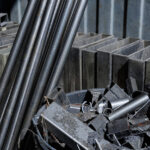The world of metals is as diverse as it is essential, playing a pivotal role in various industries and everyday life. Understanding the different types of metals, their unique properties, and applications is fundamental in material science and crucial for anyone involved in selecting materials for specific projects. This comprehensive guide delves into the common metals, their properties, applications, and provides insights on choosing the right metal for your project needs.
A Guide to Common Metals and Their Properties
Metals are broadly categorized into two groups: ferrous and non-ferrous metals. Ferrous metals contain iron, making them magnetic and prone to rust when exposed to moisture. Non-ferrous metals, on the other hand, do not contain iron, are not magnetic, and are generally more resistant to corrosion.
Ferrous Metals
- Iron: Iron is a fundamental element used in construction and manufacturing. It is strong, but also very brittle and prone to corrosion.
- Steel: An alloy of iron and carbon, steel is known for its strength and durability. It’s used in everything from infrastructure and buildings to everyday tools and appliances. Different types of steel, like stainless steel (which contains chromium), offer varying properties like enhanced corrosion resistance.
Non-Ferrous Metals
- Aluminum: Lightweight yet strong, aluminum is known for its versatility. Its resistance to corrosion and its ductility makes it ideal for applications in the aerospace, automotive, and packaging industries.
- Copper: Highly valued for its conductivity, copper is a cornerstone in the electrical industry. It’s also known for its thermal conductivity and antimicrobial properties, making it useful in plumbing, heating systems, and medical applications.
- Brass: An alloy of copper and zinc, brass is known for its malleability and acoustic properties, which make it a popular choice in musical instruments, decorative items, and fittings.
- Titanium: Known for its high strength-to-weight ratio and corrosion resistance, titanium is widely used in aerospace, medical implants, and military applications.
Each metal type possesses distinct properties that determine its suitability for various applications. For instance, aluminum’s lightweight and strength make it ideal for aerospace and automotive applications, while copper’s excellent electrical and thermal conductivity makes it indispensable in electrical wiring and plumbing systems.
Applications of Different Metals in Various Industries
Metals, with their diverse properties, are integral to the functionality and advancement of various industries. Each metal, chosen for its specific characteristics, plays a crucial role in the development and manufacturing of products across sectors.
Construction Industry
In the realm of construction, the use of metals is indispensable. Steel, known for its high tensile strength and durability, is a primary choice for structural frameworks. It provides the necessary support and stability for skyscrapers, bridges, and residential buildings. The flexibility and resilience of steel make it ideal for areas prone to seismic activity, as it can absorb and dissipate energy without compromising structural integrity.
Reinforced concrete, a composite material, utilizes steel bars or mesh to enhance its strength. This combination is particularly effective in large-scale construction projects, where the concrete provides compressive strength and the steel offers tensile strength, resulting in a material that can withstand various stresses and loads.
Automotive Industry
The automotive industry’s reliance on metals is multifaceted. Steel is commonly used for the chassis and bodywork of vehicles due to its strength and cost-effectiveness. However, with the increasing demand for fuel efficiency, the industry has turned to aluminum for engines and frames. Aluminum’s lightweight nature significantly reduces vehicle weight, thereby enhancing fuel efficiency and reducing emissions.
Precious metals like platinum and palladium play a critical role in emission control. Used in catalytic converters, they facilitate the conversion of harmful gases from exhaust into less harmful substances, thus playing a vital role in meeting global emission standards.
Electronics Industry
In the electronics industry, copper stands out for its excellent electrical conductivity. It is a fundamental component in electrical wiring, circuit boards, and batteries. Its thermal conductivity also makes it ideal for heat sinks and heat exchangers in electronic devices.
Precious metals such as gold and silver, though used in smaller quantities, are essential in high-end and sensitive electronic components. Gold, with its excellent conductive and corrosion-resistant properties, is used in connectors, switch and relay contacts, and semiconductor systems. Silver, too, finds its use in conductive adhesives and contacts in electronic devices.
Aerospace Industry
The aerospace industry requires materials that can withstand extreme conditions, and metals like aluminum and titanium are up to the task. Aluminum is extensively used in aircraft frames due to its lightweight yet strong nature, significantly reducing the overall weight of the aircraft and improving fuel efficiency.
Titanium is valued for its high strength-to-weight ratio and its ability to withstand extreme temperatures and corrosive environments. It is commonly used in jet engines and airframes, where strength, lightweight, and resistance to high temperatures are crucial.
Consumer Goods
In the consumer goods sector, metals are part of our daily lives. Stainless steel, known for its corrosion resistance and durability, is widely used in kitchen appliances, cutlery, and cookware. Its ability to resist rust and maintain a clean surface makes it a preferred choice in environments where hygiene is a priority.
Aluminum’s use extends to packaging materials like cans and foil. Its malleability allows it to be formed into thin sheets, which are perfect for packaging, while its non-toxic nature ensures food safety. The metal’s lightweight also reduces shipping costs, making it an economical choice for the packaging industry.
The application of different metals across various industries highlights their versatility and indispensability.
From the strength and durability of steel in construction to the conductivity of copper in electronics, each metal serves a specific purpose, tailored to meet the demands of the industry it serves. Understanding these applications not only underscores the importance of metals in our daily lives but also emphasizes the need for continued innovation in metal processing and recycling to sustain these industries in the future.
Choosing the Right Metal for Your Project
Selecting the right metal for a project involves a deep understanding of the project’s requirements and the properties of various metals.
Considerations for Metal Selection
- Strength and Durability: For structures or components that require high strength and longevity, metals like steel and titanium are preferred.
- Weight: In applications where weight is a concern, such as in automotive or aerospace, aluminum or magnesium alloys are ideal choices.
- Corrosion Resistance: For projects exposed to corrosive environments, stainless steel, aluminum, and copper alloys are suitable due to their corrosion-resistant properties.
- Conductivity: For electrical applications, copper is typically the go-to metal due to its excellent electrical conductivity.
- Cost: Budget constraints also play a crucial role in metal selection. While precious metals offer unique properties, their high cost makes them impractical for large-scale applications.
Case Studies: Innovative Uses of Metals in Industry
Innovative applications of metals in various industries showcase the versatility and evolving nature of material science.
- Steel in Green Building Solutions: The use of steel in green building solutions, such as in the construction of energy-efficient building frames and solar panel supports, demonstrates its adaptability in sustainable development.
- Aluminum in Electric Vehicle Batteries: The automotive industry’s shift towards electric vehicles has seen innovative uses of aluminum in battery technology to reduce weight and improve efficiency.
- Copper in Renewable Energy Systems: Copper’s role in renewable energy systems, particularly in wind and solar energy installations, highlights its importance in the transition to sustainable energy sources.
Metals in Everyday Life: An Unseen Influence
Metals are an integral part of our daily lives, often in ways we might not immediately recognize. From the stainless steel in kitchen appliances and cutlery to the copper wiring in our homes, metals are ubiquitous.
In consumer electronics, metals like gold and silver are used in small quantities for their conductive properties. In transportation, from bicycles to cars, metals form the backbone, providing strength, durability, and functionality.
Understanding the role of metals in everyday products helps us appreciate the material science behind our daily conveniences and the importance of making informed choices about the metals we use, both in industry and in consumer products.
The world of metals is rich and varied, with each type offering unique properties that make it suitable for specific applications. Whether in large-scale industrial uses or in everyday consumer products, the right selection of metal is crucial for the success and functionality of any project or product. At Pride Metals, we understand the importance of this selection process and are committed to providing expertise and guidance in choosing the right metal for your needs, ensuring that your projects are not only successful but also sustainable.







